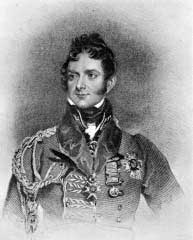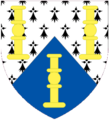Robert Torrens (judge) facts for kids
Robert Torrens (born 1775 – died 1856) was an important judge from Ireland. Most people thought he was fair and honest. Even though some critics called him "the notorious hanging Judge Torrens," many in the legal world respected his skills and honesty. He stayed on the job even when he was very old and had health problems. His daughter, Henrietta, was an ancestor of the O'Neill family.
Contents
Torrens Family History
Robert Torrens was born in Derry. He was the third child of Reverend Thomas Torrens and Elizabeth Curry. The Torrens family originally came from Sweden. Their ancestor was a Swedish officer who moved to Ireland in 1689 with the army of William III of England. The family was quite large and often married relatives, which can make their family tree a bit tricky to understand!
It's important not to confuse Judge Robert Torrens with Robert Torrens, the economist, who was his first cousin. The judge's brother was Sir Henry Torrens, a well-known military advisor. Their oldest brother, John, became a church leader called the Archdeacon of Dublin.
Robert's Early Life
Robert's parents passed away when he and his siblings were very young. Relatives then took care of them. We don't know much about Robert Torrens's time at school. He finished his studies at Trinity College Dublin in 1795. The next year, he joined Middle Temple, a place where lawyers train. He became a lawyer in 1798. Later, he became a senior lawyer (called King's Counsel) in 1817 and then a Third Serjeant in 1822.
A Judge's Career
In 1822, Robert Torrens was chosen to be a special officer for County Limerick. His job was to help solve problems with local unrest and violence in that area. People said he did his work very carefully, fairly, and kindly. Because of this, the King's government was very thankful. This, along with his brother Henry's friendship with the Duke of Wellington, helped him get a job at the Court of Common Pleas (Ireland) in 1823.
As a judge, he was well-liked. Even Daniel O'Connell, who often criticized Irish judges, seemed to think highly of him. However, one time O'Connell did make the judge uncomfortable by suggesting he was unfair to a Catholic priest.
In 1829, Torrens was one of the judges at the famous Doneraile trials. Daniel O'Connell helped most of the people accused in these trials go free. Both judges, Torrens and Richard Pennefather, were praised for being very fair during these trials.
In 1855-1856, some members of the House of Commons wanted to remove several Irish judges from their jobs. They thought these judges were too old or sick to do their work well. Robert Torrens was one of them. However, the lawyers in Ireland strongly disagreed. They argued that even though he was 80 years old, Torrens was a very dedicated and hard-working judge. Torrens himself strongly protested that he was fit for his job. Sadly, he died suddenly at his country home, Derrynoid Lodge, in 1856, right after the spring court sessions.
Robert's Family Life
Like many in the Torrens family, Robert married a cousin, Anne Torrens. They had three sons and two daughters. Their most well-known child was Henrietta Torrens (1818-1857). She married William O'Neill, 1st Baron O'Neill. They had four children, including Edward O'Neill, 2nd Baron O'Neill and Robert Torrens O'Neill, who was named after the judge.
Where Robert Lived
He mostly lived at his country home, Derrynoid Lodge, which was in Ballinascreen, County Londonderry.
Robert's Burial Place
He is buried in the Torrens family grave plot at St. Columba's Church of Ireland in Draperstown, County Londonderry.
Images for kids
 | Precious Adams |
 | Lauren Anderson |
 | Janet Collins |



